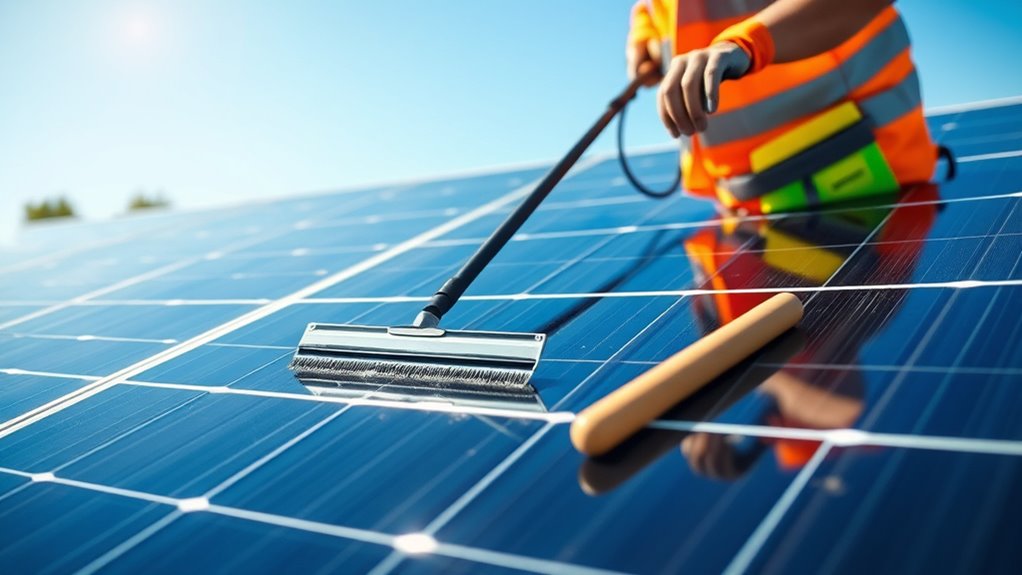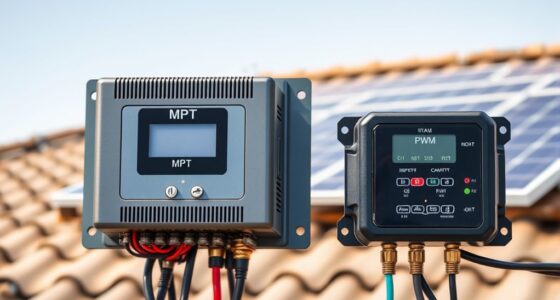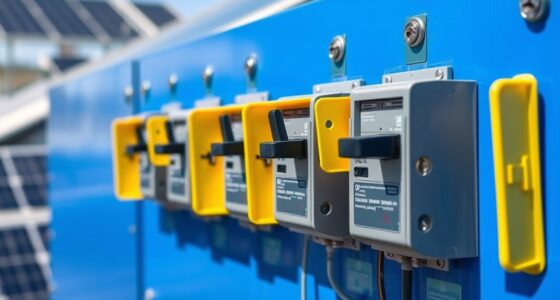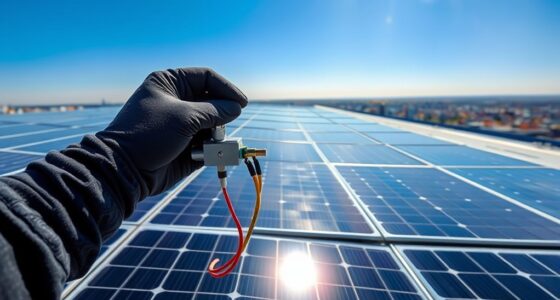To keep your solar panels performing at their best, use gentle tools like soft brushes or microfiber cloths and avoid harsh chemicals that could damage the surface. Regularly spray panels with water to remove dust, pollen, and debris, especially after storms or droughts. Inspect them often for dirt buildup or stubborn grime, and clean promptly to prevent efficiency losses. If you’d like to discover more effective techniques and tips, continue to explore further.
Key Takeaways
- Use soft brushes, microfiber cloths, or squeegees to clean panels without scratching surfaces.
- Gentle water sprays effectively remove dust, pollen, and light grime from solar panels.
- Avoid harsh chemicals; opt for mild cleaning solutions to protect panel surfaces.
- Inspect panels regularly, especially after storms or heavy winds, to identify dirt buildup early.
- Establish a cleaning schedule based on environmental factors to maintain optimal system performance.
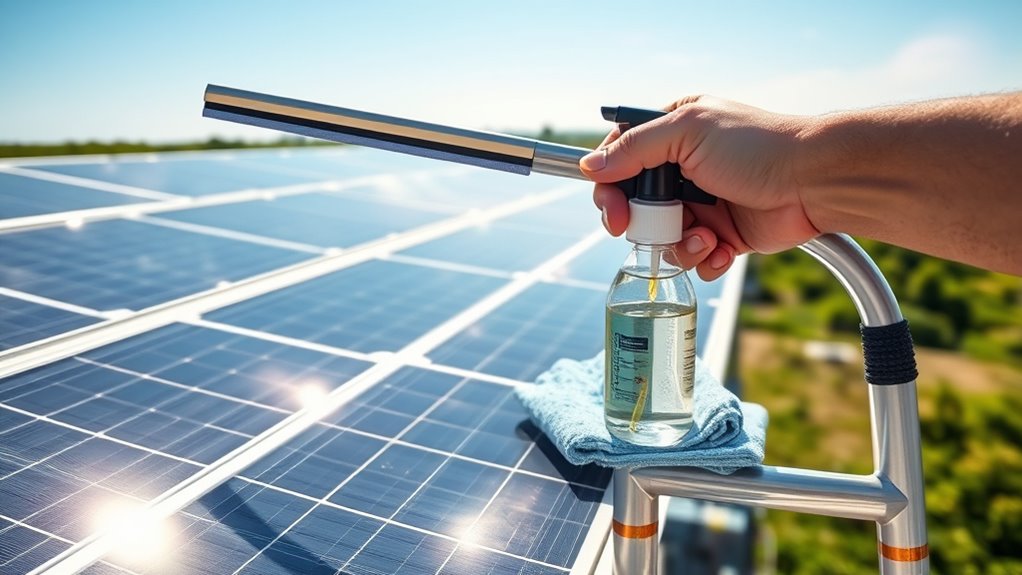
Have you ever wondered how dirt and debris affect your solar panels’ performance? When dirt accumulates on your panels, it creates a barrier that prevents sunlight from reaching the solar cells efficiently. This buildup, known as dirt accumulation, can markedly reduce the amount of energy your system produces. The more debris and grime on the surface, the less sunlight gets through, leading to a drop in overall efficiency. That’s why maintaining a regular cleaning schedule is essential. But how often should you clean your panels? The answer depends on several factors, including your location, weather conditions, and the surrounding environment. In dusty or polluted areas, you might need to clean more frequently—perhaps once a month—while in cleaner, less affected regions, quarterly cleanings could suffice. Ignoring dirt accumulation can cause a gradual decline in performance, which means you might not maximize your investment or get the full benefit from your solar system. Regular cleaning can also help prevent dirt buildup from becoming more difficult to remove over time. Understanding the importance of cleaning frequency helps you avoid unnecessary energy loss. If dirt, leaves, or bird droppings sit on your panels for too long, they can harden or become more difficult to remove over time, requiring more effort and possibly risking damage during cleaning. Regular maintenance keeps the surface clear and ensures ideal light absorption. It’s a good idea to inspect your panels after storms, heavy winds, or periods of drought, as these conditions tend to increase dirt build-up. Setting a consistent cleaning schedule based on your environment can save you money in the long run by maintaining peak efficiency and longevity of your solar panels.
When planning your cleaning routine, consider the type of dirt that tends to settle on your panels. Fine dust and pollen may settle quickly but can be easily rinsed away with gentle water sprays. More stubborn grime, bird droppings, or industrial pollutants might require more thorough cleaning methods. Always keep in mind that the goal is to remove surface dirt without scratching or damaging the panels. Using soft brushes or cloths, along with gentle cleaning solutions, can help maintain the integrity of your panels while keeping them clear of debris. Remember, the key is consistency—regular cleaning based on your specific environment ensures you’re not only preventing dirt buildup but also extending the lifespan and performance of your solar energy system.
Frequently Asked Questions
How Often Should Solar Panels Be Professionally Cleaned?
You should follow a maintenance schedule that includes professional cleaning at least once or twice a year. Cleaning frequency depends on your location and environmental factors like dust, pollen, or bird droppings. Regular inspections can help determine if panels need cleaning sooner. By sticking to this schedule, you guarantee your solar panels operate at peak efficiency and extend their lifespan, saving you money and maximizing energy production.
Can Cleaning Damage Solar Panels or Reduce Their Efficiency?
You might worry that cleaning could damage your solar panels or reduce their efficiency, but that’s often a myth. Using abrasive cleaning methods or harsh tools can cause panel scratches, which might slightly decrease their performance over time. To avoid this, stick to gentle cleaning techniques and soft brushes. Proper cleaning, done carefully, actually helps maintain peak efficiency, ensuring your panels operate at their best without risking damage.
Are There Eco-Friendly Cleaning Solutions for Solar Panels?
You’ll be glad to know there are eco-friendly cleaning options for solar panels. Using biodegradable solutions helps you clean effectively while protecting the environment. These eco-friendly cleaning products are gentle yet effective at removing dirt and grime without harsh chemicals. By choosing biodegradable solutions, you guarantee your panels stay efficient and your ecological footprint stays small. Always opt for eco-friendly cleaning to maintain peak performance responsibly and sustainably.
What Safety Precautions Are Necessary During Cleaning?
Imagine you’re on the roof, sunlight casting shadows—safety should be your top priority. Always wear safety gear like gloves, goggles, and a harness, especially at heights. Be aware of hazards such as slippery surfaces or electrical components. Stay alert to your surroundings, and avoid rushing. Hazard awareness helps prevent accidents, ensuring your cleaning session is safe and effective. Safety isn’t just a precaution; it’s your best tool.
How Do Weather Conditions Affect Cleaning Schedules?
Weather conditions critically influence your cleaning schedule. Seasonal weather changes, like spring rain or autumn leaves, can require more frequent cleaning. Wind impact is also vital; strong winds can stir up dust and debris, making it best to clean after calmer days. Avoid cleaning during storms or extreme heat to guarantee safety and effectiveness. Monitoring local weather helps you pick the ideal times for cleaning, maintaining solar panel efficiency year-round.
Conclusion
Regularly cleaning your solar panels guarantees they operate at peak efficiency. For example, imagine a homeowner who notices a 15% drop in energy output after months of neglect. A simple wash with a soft brush and water restores their panels’ performance, saving money on energy bills. Don’t wait for dirt or debris to reduce your system’s power—stay proactive with regular cleaning, and you’ll maximize your solar investment for years to come.
